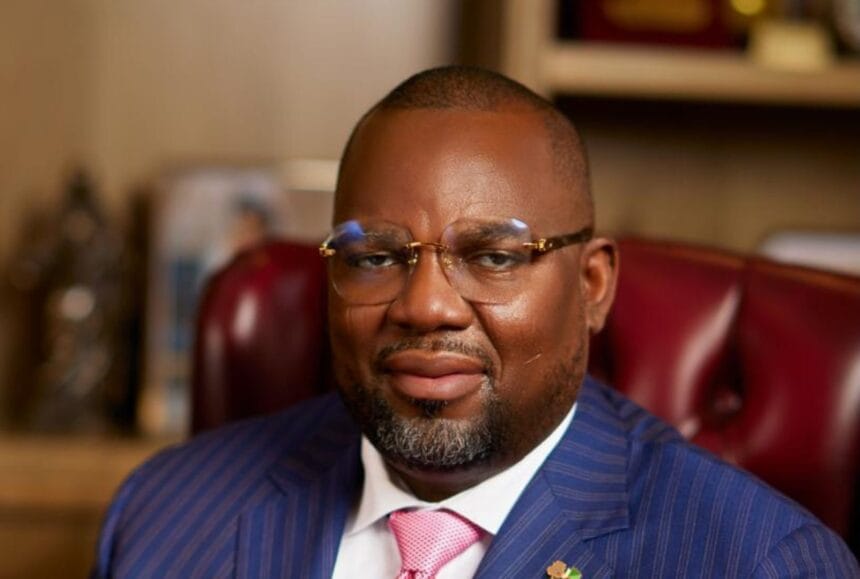Oredola Adeola
UTM Offshore Limited, led by Group Managing Director/CEO Mr. Julius Rone, is nearing the Final Investment Decision (FID) for Nigeria’s first $5 billion floating Liquefied Natural Gas (FLNG) project, in collaboration with the African Export-Import Bank and other key stakeholders, with an announcement expected soon.
Mr. Rone, widely known as the “Gas King,” disclosed this during a one-on-one interview with members of the African Association of Energy Journalists and Publishers, drawn from 54 African nations.
The engagement was co-hosted by Mr. Camara Sanna, a Gambia-based media consultant, and Allen Atwiine, Managing Partner of Surprise Africa, Uganda.
Mr. Rone said, “All the engineering studies have been completed, and the license to construct has been approved by the Nigerian Downstream and Midstream Petroleum Regulatory Authority (NMDPRA),” adding that Ekperikpe Ekpo, Minister of State for Petroleum Resources (Gas), presented the license about three weeks ago.
Discussing the project’s progress, Rone stated, “It’s like building a house – you identify the land, clear the site, and do your engineering studies. Once you finish the design, you prepare to get all your permits. We’ve now secured approval to construct the first floating LNG plant in Nigeria and are working toward taking the FID.”
UTM Offshore has been working closely with the African Export-Import Bank to arrange the necessary debt and equity for the project. “We are very pleased with the level of aggregation of the debt and equity being arranged by the bank. We had a meeting with them in New York, and we look forward to announcing the FID soon,” he added.
A crucial condition for the FID is the Sales and Purchase Agreement (SPA). According to Rone, UTM Offshore already has an international offtaker ready to market the product to Europe and other parts of the world.
Reflecting on the inspiration behind the project, Rone noted his personal connection to Nigeria’s energy sector.
“As a Niger Deltan, I grew up surrounded by exploration and production activities, and I developed a passion for contributing to Nigeria’s energy development,” he said.
He highlighted that Nigeria, as the leading oil and gas nation in Africa, did not yet have a floating LNG plant, a gap he sought to fill. “Africa’s two floating LNG plants are owned by international oil companies. We took it upon ourselves to change that narrative,” he said.
Rone emphasized that the FLNG project would have far-reaching benefits, including reducing gas flaring and creating jobs. “The project will create 7,000 direct and indirect jobs across the value chain, with over 25,000 jobs generated during the construction phase alone. Additionally, Nigerian youths will be trained internationally to manage and upgrade the plant,” he said.
On completion, the UTM FLNG is expected to support Nigeria’s energy demands, including the supply of over two million tonnes of Liquefied Petroleum Gas (LPG) for domestic consumption, reducing the country’s reliance on imports and boosting the value of the local currency. The project is also poised to benefit other African countries, with discussions underway to supply LNG to South Africa.
Rone further stressed the importance of African governments creating an enabling environment for energy investments.
He urged governments to simplify regulatory processes, avoid double taxation, and maintain consistency in policies to attract and retain investors. “The government must provide access to funding and ensure that investors can freely enter and exit markets,” he said.
In response to global energy transition discussions, Rone reaffirmed Africa’s need to develop its fossil fuel resources. “Developed economies may be focused on energy transition, but Africa still faces energy poverty. Leaders have identified gas as the transition fuel, following examples like Qatar, which has leveraged its gas resources for development.”
With the UTM Offshore FLNG project, Rone believes Nigeria and Africa will take a significant step toward reducing energy poverty while positioning themselves in the global energy market.
Rone, a key player in Nigeria’s oil and gas sector, highlighted the urgent need for African nations, including Nigeria, to take advantage of the global window for funding gas projects.
He emphasized that the Nigerian government has already created an enabling environment through executive orders that offer incentives for gas project development. Additionally, government-backed financial support is in place to attract more stakeholders into the gas industry.
“This is the time for African countries to wake up and encourage investors to bring in their funds to the energy sector, using gas as the transition fuel,” Rone said.
Addressing the challenges investors face in Africa, Rone cited inadequate funding, inconsistent government policies, and multiple taxation regimes across the continent. In Nigeria, issues like insecurity are being tackled, but he also drew attention to the high levels of perceived corruption, which deter investors from committing capital.
“Investors do not want to put their money where corruption is perceived to be rampant. Good corporate governance, checks and balances are crucial to building confidence,” he stressed.
Rone also called for African governments to streamline regulatory processes and offer more incentives such as tax breaks and waivers. He suggested that a single, unified payment platform for investors operating across multiple African countries would facilitate quicker transactions and foster trade within the continent.
“We need more platforms that allow seamless transactions. Investors should be able to sit in Nigeria and trade with someone in Senegal, without the complexities of currency exchange. Payments should be settled directly in local currencies,” he explained.
Rone urged African governments to provide a conducive atmosphere for investors by eliminating bureaucratic bottlenecks.
“Investors should be able to travel across Africa without visa hassles, and company registration processes should be swift, allowing businesses to start without unnecessary delays,” he said, noting that it can currently take up to 48 hours to travel from Nigeria to Angola or Mozambique due to a lack of direct flights.
Looking ahead to the African Energy Week 2024 in Cape Town, South Africa, Rone revealed that he will be discussing the challenges of attracting investments into Africa’s energy sector, drawing from UTM Offshore’s experience.
“I will be sharing our insights on financing and the importance of having bankable projects. Investors need to know that financiers are investing other people’s money, so projects must be solid to secure funding,” he remarked.
On the proposed African Energy Bank, which will be headquartered in Nigeria, Rone underscored its significance, stating that it will play a vital role in financing oil and gas projects across the continent, especially as European banks increasingly shy away from such investments.
“When the African Energy Bank is operational, we hope to work with it on future projects,” he added.
Rone also disclosed that UTM Offshore is in discussions with the Nigerian Content Development and Monitoring Board (NCDMB) to train youths, ensuring they acquire the skills needed to participate in the industry and manage plant operations efficiently.



